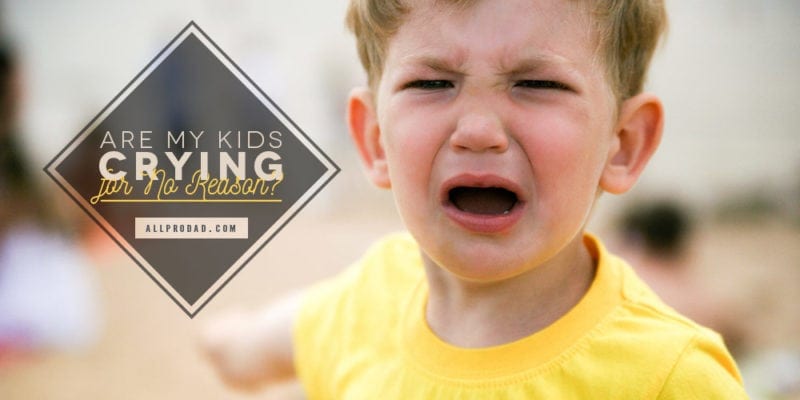When my son was six, he played on a soccer team for the first time. They were a good team and seemed to win game after game. During the last game of the year, they started to lose. My son started crying which was not a surprise to me and ran off the field into my chest. I was able to calm him down enough to go back out there, but the rest of the game he was a mess. When the game was over, his coach, a sweet and well-intentioned woman, told me that I shouldn’t let him be so hard on himself. I told her I would work on it, but really it wasn’t that he felt like he failed or didn’t play well. The reason he was crying was a combination of frustration and hurt from losing. Those emotions combined with a level of sensitivity equals a blowout.
Kids cry for a variety of reasons. Are there ever kids crying for no reason? Probably not, but sometimes it is over the smallest things. This can be confusing for a parent to address. If your kid cries all of the time, it is helpful to know what is going on below the surface. Here are several common reasons kids cry and how to address it.
They’re tired.
This is probably the most common. When my kids lose it, I normally see a yawn in the midst or right after. I know that when I am tired I tend to react to things more emotionally and make worse decisions, but somehow I expect my kids to act differently. Kids get tired quickly when they do not have a routine. Try to keep regular bedtimes. When dinner ends, start preparing them for good sleep. Limit the things after dinner that stimulate them, such as sugar intake and screen time (TV, computer, iPad, video games).
They’re looking for attention.
This is the second reason I evaluate. If kids aren’t getting enough attention from their parents, they will tend to act out to get what they are missing. It’s not always good to immediately respond to tears or they may start using it as a means to get attention. However, it is a reminder for me to be more proactive in making time for them or being more present and focused on them when I’m home. Work at having some one-on-one time each day to talk. Even if it is just 15 minutes, that makes a difference in them feeling individually cared for.
They’re flooded with emotion.
Developmentally kids aren’t able to think abstractly until sometime in high school. At times, they will get a flood of emotion without being able to communicate or even know why. Kids need to know that there is nothing wrong with their emotions and sensitivity. Those are good things. They enable us to connect, grow our love and have empathy for others. They don’t need to cut off those emotions or become less sensitive. What they need are techniques to manage their emotions because there are people, particularly other kids, who are unsafe to be vulnerable with. Work with them on ways they can calm themselves down.
They want control.
You are making them do something they don’t want to do. Whether it is cleaning their room or running errands, the tears probably come with a tantrum. Overcoming their willful opposition is critical in these moments. They need to know that they are not in charge—and for good reason.
They feel anxiety and fear.
This can be a deep-seated issue. Perhaps a traumatic experience where the emotions are easily triggered. They may feel a lack of security if there have been foundational changes in their life like a divorce or moving to a new town. If crying occurs often from anxiety and fear, I would advise seeing a counselor.
Bonus: They are overloaded with sugar and food dye.
Sugar and food dye affect the chemistry of your child. I have noticed that when my kids are full of sugar and food dye, especially red dye, they are more emotional. When they are deprived of both, they are more sober and aware of their emotions.
Sound off: What are some other possible reasons for kids’ frequent crying?











Huddle up with your kids and ask, “What are the things that upset you the most?”